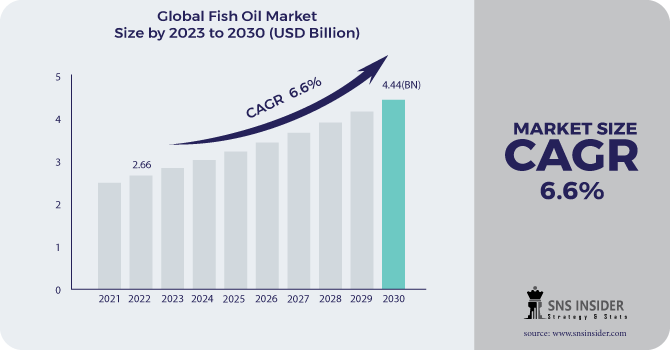Fish Oil Market Report Scope & Overview:
Fish Oil Market Size was valued at USD 2.66 billion in 2022 and is expected to reach USD 4.44 billion by 2030, and grow at a CAGR of 6.6% over the forecast period 2023-2030.
The fish oil is without gluten and incorporates hemicellulose, which is a paste-like part found in corn. In this way, being without gluten, it is for the most part consumed by wellbeing cognizant purchasers and those with celiac illness.

The rising interest in fish oil by the more established populace, alongside the significant development of the hydroponics business, are the fundamental variables driving the development of this market. Likewise, fish oil offers various medical advantages. It has omega-3 unsaturated fats like EPA (Eicosapentaenoic corrosive), which works on the working of the cardiovascular framework, and DHA (Docosahexaenoic corrosive), which assumes an imperative part in the productive working of the sensory system. This has essentially upgraded the interest in fish oil.
Market Dynamics:
Driving Factors:
-
An expansion in well-being mindfulness among people in general, and significant development in the hydroponics business.
Restraining Factors:
-
The lockdown vigorously affected end-use businesses.
Opportunities:
-
The rising interest in the enhancement business.
Challenges:
-
Excessive costs of Fish Oil Market, joined with a popularity supply hole in the Fish Oil Market.
Impact of Covid-19:
Numerous enterprises, for example, the food and refreshment industry, confronted extraordinary difficulties because of the COVID-19 pandemic. The deficiency of natural substance and work, the closure of processing plants, and other functional challenges under COVID-19 wellbeing conventions adversely affected the fish oil market. The lockdown intensely influenced end-use ventures, limiting the development of the fish oil market.
Notwithstanding, the presentation of the COVID-19 antibody has additionally facilitated the circumstance prompting an ascent in business exercises around the world. The economies are restoring their activities, and the interest in fish oil is supposed to internationally rise. Key makers have begun continuing their tasks, expanding the creation limit of fish oil.
Market Estimation:
In light of the species type, the worldwide fish oil market is bifurcated into blue whiting, anchoveta, sardine, capelin, and others. As per the United States Food and Drug Administration (USFDA), sardine has a low mercury fixation (i.e., underneath the least level) contrasted with salmon, mackerel, anchovies, and fish. These are low in mercury as a result of their little size and involve the base of most situations in the oceanic pecking order.
Market Segmentation:
By Source:
-
Anchoveta
-
Sardine
-
Capelin
-
Menhaden
-
Herring
-
Anchovy
-
Others
By Distribution Channel:
-
Hypermarkets and Supermarkets
-
Specialty Stores
-
Online Stores
-
Others
By End-User:
-
Aquaculture
-
Animal Feed
-
Nutritional Supplements
-
Pharmaceutical
-
Others
.png)
Regional Analysis:
-
North America
-
USA
-
Canada
-
Mexico
-
-
Europe
-
Germany
-
UK
-
France
-
Italy
-
Spain
-
The Netherlands
-
Rest of Europe
-
-
Asia-Pacific
-
Japan
-
south Korea
-
China
-
India
-
Australia
-
Rest of Asia-Pacific
-
-
The Middle East & Africa
-
Israel
-
UAE
-
South Africa
-
Rest of Middle East & Africa
-
-
Latin America
-
Brazil
-
Argentina
-
Rest of Latin America
-
The worldwide market for fish oil incorporates the Asia-Pacific, North America, Europe, Latin America, the Middle East, and Africa.
North America is the most encouraging territorial market and is supposed to develop the quickest in the gauging span when contrasted with others. The United States and Canada produce and consume fish oil for a huge scope. Additionally, the state-run administrations of these countries suggest the admission of fundamental Omega-3 unsaturated fats like EPA and DHA. This has fundamentally raised the interest in fish oil over the most recent few years, and it is being integrated in drug, supplements, and practical food applications.
Key Players:
Major Key players included in this report are DSM, BASF, Pelagia (EPAX), Golden Omega, TASA, Omega Protein, Croda, GC Rieber, Polaris, and Auqi.
Golden Omega-Company Financial Analysis

| Report Attributes | Details |
|---|---|
| Market Size in 2022 | US$ 2.66 Billion |
| Market Size by 2030 | US$ 4.44 Billion |
| CAGR | CAGR 6.6% From 2023 to 2030 |
| Base Year | 2022 |
| Forecast Period | 2023-2030 |
| Historical Data | 2020-2021 |
| Report Scope & Coverage | Market Size, Segments Analysis, Competitive Landscape, Regional Analysis, DROC & SWOT Analysis, Forecast Outlook |
| Key Segments | • by Source (Anchoveta, Sardine, Capelin, Menhaden, Herring, Anchovy, Others) • by Distribution Channel (Hypermarkets and Supermarkets, Specialty Stores, Online Stores, Others) • by End User (Aquaculture, Animal Feed, Nutritional Supplements, Pharmaceutical, Others) |
| Regional Analysis/Coverage | North America (USA, Canada, Mexico), Europe (Germany, UK, France, Italy, Spain, Netherlands, Rest of Europe), Asia-Pacific (Japan, South Korea, China, India, Australia, Rest of Asia-Pacific), The Middle East & Africa (Israel, +D11UAE, South Africa, Rest of Middle East & Africa), Latin America (Brazil, Argentina, Rest of Latin America) |
| Company Profiles | DSM, BASF, Pelagia (EPAX), Golden Omega, TASA, Omega Protein, Croda, GC Rieber, Polaris, and Auqi |
| Key Drivers | •The storing idea of the shopper during the pandemic was brought about by a lengthy lockdown. •The rising buyer interest for bundled and handled food items. |
| Market Opportunities | •The rising interest in the enhancement business. |

